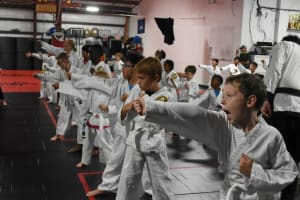
Children born during the pandemic have shown their communication skills lag behind those of their predecessors. What can we do to help our children be the best version of themselves? Martial arts can have a positive impact on children's communication skills in several ways:
- Confidence: Martial arts training helps children build confidence in themselves. As they gain proficiency in their techniques and progress through belts, they become more self-assured. This newfound confidence can translate into better communication as they are less likely to be shy or hesitant when expressing themselves.
- Respect and Discipline: Most martial arts emphasize respect for instructors, peers, and the martial arts itself. Children learn to listen carefully to instructions and show respect to others. This respect and discipline can carry over into their interactions outside of the dojo or training area.
- Effective Listening: In martial arts classes, students must listen attentively to their instructors to understand and execute techniques correctly. This improves their ability to listen and process information, a crucial aspect of effective communication.
- Verbal Communication: Many martial arts classes include verbal communication as part of the training. Students may need to ask questions, seek clarification, or provide feedback to their instructors or training partners. This practice improves their verbal communication skills.
- Non-Verbal Communication: Martial arts often involve non-verbal communication, such as body language and eye contact. Children learn to read and interpret these cues, which can be valuable in understanding others and conveying their own thoughts and feelings.
- Conflict Resolution: Martial arts teach children techniques for self-defense, but they also emphasize using these skills responsibly and avoiding unnecessary conflict. This can help children develop conflict resolution skills, including de-escalation and negotiation.
- Teamwork: Some martial arts, like Brazilian Jiu-Jitsu and judo, involve partner drills and sparring. Children must work together with their training partners, which fosters teamwork and cooperation. These skills are transferable to group settings outside of the dojo.
- Goal Setting and Achievement: In martial arts, children set goals to advance through belt ranks. They learn the importance of setting and working towards goals, which can apply to various aspects of life, including communication. Clear communication is essential when discussing and pursuing goals.
- Emotional Regulation: Martial arts can help children develop emotional regulation skills. Through training and discipline, they learn to control their emotions, which can positively impact how they express themselves and respond to others.
- Self-Expression: As children become more comfortable with themselves and their abilities through martial arts, they may be more willing to express their thoughts, ideas, and feelings. This self-expression is a fundamental aspect of effective communication.
In summary, martial arts can improve children's communication skills by fostering confidence, respect, effective listening, verbal and non-verbal communication, conflict resolution, teamwork, goal setting, emotional regulation, and self-expression. These skills are not only valuable in martial arts but also in various aspects of their personal and social lives.


